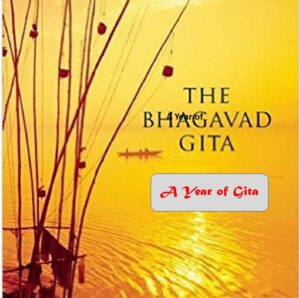All memorable speeches start with a bang!
And so are movies, stories, and dramas.
The same principle is used in Bhagavad Gita. The first
chapter opens the Geeta with a bang!
Huge armies on both sides are facing each other, almost
about to begin the attack. Arjuna requests his chariot to bring between two
armies and looks at his teacher and grandfather.
Arjuna has panic attack, anxiety-neurosis, or nervous
breakdowns.
And a most revered warrior refuses to fight!
Try to visualize this, quite a drama!
Geeta’s first chapter starts with all this drama.
Some nuggets from the first chapter.
1.
Sanskrit text’s first letters/Stanza are
carefully crafted. Geeta begins with the word “Dharma”. Though the
rough translation is religion. But Swami Chinmay Ananda suggests that it’s
neither religion nor righteousness. It is much more than that. Here it means,
“that makes a thing what it is”. It is the “essential nature of
anything”. So essential that without it can not retain its independent
existence (Ref 1). (1.1)
2.
The first stanza is the only stanza in the whole
of Geeta that is uttered by Dhritrashtra (धृतराष्ट्र). (1.1)
3.
Hrishikesha is translated by commentators as
“Hrishika + isha” (lord of senses) or even as “Hrishi + Kesha” -having short
hairs. Commentators Swami Chinmaya Ananda, as well as Lokmanya Tilak, commented
on this (Ref 1, 2). (1.15)
4.
Only a few words (Half of the stanza) are spoken
by Krishna in the first chapter (1.25)
5.
Symptoms of mental illness or Anxiety-neurosis
or panic attack are listed as Sad talk, trembling limbs, dry mouth, spinning
head, and depression for commonly liked things (1.27 to 1.30). (Ref. 1).
6.
Then Arjuna goes about rationalizing his
decision to not fight a war.
7.
He talks from a personal point of view,
individual loss/sacrifice (power/wealth), and family issues, then he talks
about breaking a family unit leading to loss of values and finally how women
will fall in disgrace.
1st Chapter creates a drama, arouses readers’
interest, and develops a context for the rest of the chapters.
Ref. 1: The Holy Geeta – Swami Chinamay Anand.
Ref. 2: Geeta Rahasya – Lokmanya Tilak.

